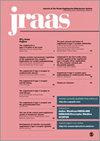Effects of dual blockade in heart failure and renal dysfunction: Systematic review and meta-analysis
IF 4.1
4区 医学
Q3 PERIPHERAL VASCULAR DISEASE
Journal of the Renin-Angiotensin-Aldosterone System
Pub Date : 2019-10-01
DOI:10.1177/1470320319882656
引用次数: 2
Abstract
Objective: The effect of dual renin–angiotensin system (RAS) inhibition in heart failure (HF) is still controversial. Systematic reviews have shown that dual RAS blockade may reduce mortality and hospitalizations, yet it has been associated with the increased risk of renal dysfunction (RD). Surprisingly, although RD in patients with HF is frequent, the effect of combining RAS inhibitors in HF patients with RD has never been studied in a meta-analysis. Methods: A systematic review and meta-analysis of randomized clinical trials involving HF patients with RD who received dual blockade analyzing death, cardiovascular (CV) death or HF hospitalization, and adverse events. Results: Out of 2258 screened articles, 12 studies were included (34,131 patients). Compared with monotherapy, dual RAS inhibition reduced hazard ratio of death to 0.94 (p=0.07) and significantly reduced CV death or HF hospitalization to 0.89 (p=0.0006) in all individuals, and to 0.86 (p=0.005) in patients with RD and to 0.91 (p=0.04) without RD. Nevertheless, dual RAS blockade significantly increased the risk of renal impairment (40%), hyperkalemia (44%), and hypotension (42%), although discontinuation of treatment occurs only in 3.68% versus 2.19% (p=0.00001). Conclusions: Dual RAS inhibition therapy reduces the risk of CV death or HF hospitalization. However, cautions monitoring for specific adverse events may be warranted.双重阻断对心力衰竭和肾功能障碍的影响:系统回顾和荟萃分析
目的:双肾素-血管紧张素系统(RAS)抑制在心力衰竭(HF)中的作用仍有争议。系统综述表明,双重RAS阻断可降低死亡率和住院率,但与肾功能不全(RD)风险增加有关。令人惊讶的是,尽管心衰患者经常发生RD,但联合RAS抑制剂对心衰合并RD患者的影响从未在荟萃分析中研究过。方法:对接受双重阻断治疗的HF合并RD患者的随机临床试验进行系统回顾和荟萃分析,分析死亡、心血管(CV)死亡或HF住院以及不良事件。结果:在2258篇筛选文章中,纳入了12项研究(34,131例患者)。与单药治疗相比,双重RAS抑制将所有个体的死亡风险比降低至0.94 (p=0.07),并将CV死亡或HF住院率显著降低至0.89 (p=0.0006), RD患者降低至0.86 (p=0.005),非RD患者降低至0.91 (p=0.04)。然而,双重RAS阻断显著增加了肾功能损害(40%)、高钾血症(44%)和低血压(42%)的风险,尽管停止治疗的发生率仅为3.68%,而非2.19% (p=0.00001)。结论:双重RAS抑制治疗可降低CV死亡或HF住院的风险。然而,注意监测特定的不良事件可能是必要的。
本文章由计算机程序翻译,如有差异,请以英文原文为准。
求助全文
约1分钟内获得全文
求助全文
来源期刊
CiteScore
6.20
自引率
0.00%
发文量
16
审稿时长
6-12 weeks
期刊介绍:
JRAAS is a peer-reviewed, open access journal, serving as a resource for biomedical professionals, primarily with an active interest in the renin-angiotensin-aldosterone system in humans and other mammals. It publishes original research and reviews on the normal and abnormal function of this system and its pharmacology and therapeutics, mostly in a cardiovascular context but including research in all areas where this system is present, including the brain, lungs and gastro-intestinal tract.

 求助内容:
求助内容: 应助结果提醒方式:
应助结果提醒方式:


